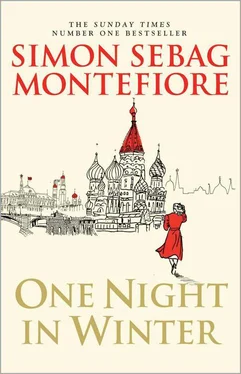It was late in the evening when Hercules Satinov got home, but as soon as he opened his door, Tamara threw herself into his arms as if she had been waiting for him. She was so distraught that she could scarcely speak, and her skin was mottled with weeping. In the background he could hear Leka the housemaid sobbing too.
‘You’ve got to do something. You’ve got to talk to Stalin!’ Tamara cried.
The Name made Satinov’s cheeks tighten and his eyes keen. He took his wife’s hands and led her into his study. George had been in the Lubianka for weeks now, and long days had passed since they had thought he was going to be released. And still no word.
‘Call Stalin!’ she was shouting. ‘Now! I’ll call him myself!’
It had to be the children – or was it… no: had something happened to George? He had lost one son already. Could he bear the loss of another?
‘Tamriko, calm down. Tell me what’s happened.’
‘They’ve taken Mariko! She’s six, Hercules. Get her released! How will she survive in there?’
Oh my God: little Mariko, his only daughter, the jewel in his crown. A pulse started high on his cheek, and the fury rushed through him. The humiliation stung him. Analyse what this means, he told himself. Put together the pieces of the jigsaw in a game where there are no coincidences.
Stalin specialized in surprises, and Satinov spent his time predicting them if he could. Earlier that day, Marshal Shako and five other generals had been arrested. He knew this concerned the planes. It was aimed at him as the boss of the aircraft industry. But Mariko! This was unworthy of a Bolshevik, unworthy of Stalin.
The phone rang. Both of them jumped. Satinov answered it. ‘Satinov. I’m listening… Comrade Abakumov, thank you for calling.’ He looked at Tamara and gestured reassuringly as he listened. As he held the phone, Tamara stood up and pressed herself against him, laying her head on his shoulder; he wrapped his other arm around her. ‘Yes, naturally we’re worried… Yes Tamara is upset. Mariko is only six, comrade general, she’ll be terrified and—’
‘Tell him Mariko doesn’t eat eggs,’ said Tamara. ‘She’s allergic and if she doesn’t have a biscuit at eleven, she feels faint. She doesn’t have her toy dogs, and she can’t sleep without them. Tell him, Hercules!’ But Satinov held up a finger for quiet.
‘Comrade general, I know Mariko was on the bridge that night and I appreciate that it is the Organs’ Communist duty to investigate. If Mariko is essential, then yes she must be questioned.’ He listened. ‘I appreciate that… Tamara will be there twice at eight a.m. and eight p.m. Thank you, Comrade Abakumov… Bolshevik greetings to you too.’
When he put the phone down, he gripped Tamriko firmly and told her that she would be allowed to visit Mariko in the Lubianka first thing in the morning and twice a day as long as she was being questioned, and she could take a food hamper.
‘How can they do this?’ said Tamara. ‘What kind of men are they? Tell Stalin! Call him!’
She did not know that Stalin was at the Potsdam Conference, his movements a state secret. Satinov held Tamara very tightly, her hair and the nape of her neck against his face, with their sweet smell that reminded him of home and children.
‘The Organs act only with the highest authority,’ he said, and this she understood. Abakumov would never have dared to arrest a Politburo member’s little girl without Stalin’s permission.
‘Hercules,’ she said softly, ‘how am I going to get through this? I just don’t know if I can. I feel I’m dying inside. I love her so much…’ She was weeping in his arms and she seemed so fragile, so exquisitely tiny, that he felt as if he could count every bone in her body. ‘How are we to survive?’
‘We will,’ he whispered back, ‘because we have to.’
‘Don’t fuck us around any more, Andrei. We think you’re being very stubborn for the son of an Enemy of the People,’ Colonel Komarov told Andrei later that evening. ‘My boss is getting bored with studying Pushkin so either we beat this shit out of you, or you just answer the question.’
‘On Pushkin?’
‘Yes. They say you’re the scholar on Onegin .’
What are the Organs up to now? he wondered. Are the Organs setting up a course on poetry? After all, they had departments for everything from tailoring to medicine and gold-mining, so why not Pushkin too? More likely, it was a trick of some sort.
‘I don’t know it half as well as some people,’ he said.
‘“NV ”. What’s it stand for?’
‘You said it meant New Leader.’
‘Now we think it’s something to do with Onegin .’
Andrei nodded slowly. ‘I think you may be right. My feeling is that NV may have been some codename for Rosa Shako.’
‘That’s convenient,’ chuckled Komarov. ‘She being on the slab with nine grams in her breast.’
‘It’s just what I think.’
‘Let me help you with your thinking,’ and suddenly Komarov moved very quickly, twisting Andrei’s arm and dragging him by it so that the chair went flying. The door opened and two warders rushed in. They grabbed him as Komarov kicked away his knees, leaving him gasping in agony. ‘Let’s go.’
Across the corridor and into the room with the two-way mirror they went, the warders holding him so that his arms hurt. In the next room, a woman was reading aloud from a newspaper. When Andrei looked through the glass, he groaned. It was his mother, right here in Lubianka.
‘Oh my God, Mama! What are you doing here?’ he called to her.
‘She can’t hear you or see you. We’re sick of you brats and our boss has told us to solve it tonight, whatever the cost. If you help us, we’ll let you see your mother. But if you hold back, she’ll get ten years in Kolyma.’ Komarov shrugged. ‘But you know she won’t survive. She’s skin and bone.’ He pulled down a beige blind, stained with dark brown specks. ‘So, Andrei?’
He turned to face Komarov. Before him stood an uneducated popinjay, insignificant in every respect except that he had the power of life and death over him and his mother.
‘NV can only be one person,’ he said. ‘It’s Nina Voronskaya.’
‘Nina Voronskaya. Is she at the school? We’ll arrest her right away.’
‘No, respected investigator, she’s a fictional character in Onegin , a beautiful society hostess in Petersburg.’
Komarov frowned. ‘But she can’t be,’ he reasoned. ‘Why would Nikolasha Blagov put her in the notebook if she wasn’t real?’
Andrei saw how the progress of this case resembled a play in the theatre. None of it was true, and he had no idea how the plotline would conclude. Yet this deadly fantasy could be tilted one way or the other by a word too many here, a piece of bad luck there.
‘Hurry up, boy, or the same thing will happen to you that happened to your father. Twenty-five years, remember?’
‘Without right of correspondence.’
‘Oh, of course,’ Komarov sneered. ‘Without right of correspondence.’
His laughing sarcasm opened Andrei’s eyes with crystal-clear clarity. His father was no longer amongst the living. He had died right here in Lubianka.
Andrei had never known why his father had been arrested, but he knew that in 1937–8, thousands of comrades like his father had been executed. He had always presumed that his father had committed some political crime – but it occurred to him, after his own experiences with ‘Soviet justice’, that his father could have been completely innocent. He had probably done nothing and been shot for some fabricated crime – treason or spying or Trotskyism – based on a false denunciation. These revelations, accompanied by the sight of his mother, almost broke him for the first time.
Читать дальше












